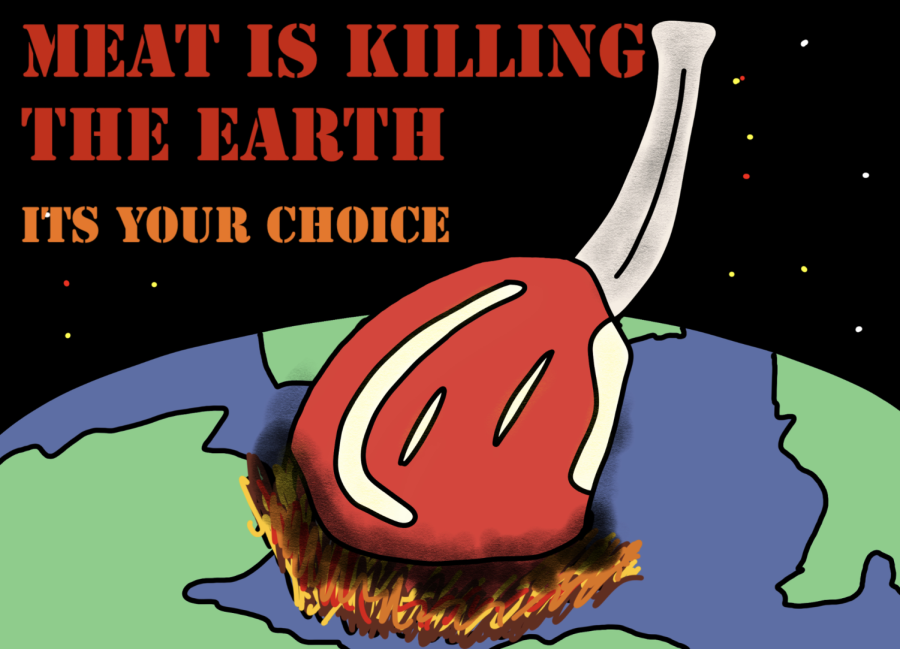Your choice: the “beefy” problem of meat
Mar 24, 2022
From ham sandwiches at picnics, beef patties in school lunches, to hotdogs at sporting events, meat is everywhere. Recently, the rise in global meat consumption dramatically rose, increasing over 58 percent in the past 20 years. A large portion of this growth has been attributed to developing and recently developed nations such as China and Argentina, whose meat consumption has risen over 72 percent since 1998.
When discussing the consequences of meat consumption, one might consider the ethical implications, antibiotics, or related health risks. However, these issues pale in comparison with the damage the meat industry inflicts on the climate. Currently, livestock grown for meat is responsible for 14.5 percent of global greenhouse gas emissions, which exceeds those of residence and housing.
In particular, beef is the largest contributor to greenhouse emissions and is responsible for 40 percent of all greenhouse gases stemming from livestock. The issue is present within the digestive system of the cattle, where the process of digesting cellulose releases methane, a greenhouse gas over 25 times worse than carbon dioxide.
Cows are also one of the worst converters of calories from their feed into their meat, as the ratio of calories consumed to produced is 25:1. Similarly, livestock takes up over 80 percent of all the land on earth used for agriculture, but only produces 20 percent of the world’s calories, which is furthering ethical questions regarding world hunger.
Direct greenhouse gas emissions from meat are not the only way that the meat industry worsens greenhouse gasses. As many uninformed farmers of developing countries such as Brazil raise cattle, they often disregard laws of deforestation and burn down acres of the rainforest to create grazing land. 80 percent of the total deforestation of the Amazon is attributed to cattle herding, and the farmers are not fully aware of the impact, or unwilling to risk their livelihoods.
Not only does this deforestation allow for the direct release of methane by the cultivation of cattle, but it also destroys the Earth’s largest carbon sink, which will cause irrevocable damage in the long run. Likewise, the other consequences that were previously mentioned like the overuse of antibiotics and the serious ethical dilemma are also a factor to consider when discussing the cons of meat consumption.
Does this mean that everyone who consumes meat regularly is a bad person? Does this mean that you have to stop eating meat? No, not necessarily. But there are small actions that we could take to help alleviate this “beefy” problem.
Firstly, rather than ceasing all consumption of meat immediately, it would be more realistic to choose one or more days of the week that would be meatless. Meatless Mondays, which is a historical practice dating back to WWI, is gaining traction in social media, and even a single day without meat every week would add up in the course of several years.
A more drastic approach would be going vegan or vegetarian, although consulting a nutritionist would be advised before a major change in diet. Asking a friend who enjoys a plant-based diet about the process would also be helpful since it allows you to be well-informed on what you would be gaining and sacrificing.
Regardless of how bad meat is for the planet, asking meat lovers to give up the savory, fatty taste of meat is indeed a difficult decision. In that case, several alternatives might do the trick, such as cell-grown meat from laboratories, which creates real beef through synthetic processes. Although current lab-grown meat is too expensive for the commercial market, research and developments in the field can make commercial lab meat a possibility.
Similarly, a currently viable alternative would be plant-based meats. Companies such as Impossible Burger or Beyond Meats are aiming to simulate the taste, texture, smell, and even the sound of meat, which are being perfected through years of research. Fast food brands such as Burger King have even adopted these alternatives into their menus, with the Impossible Burger being available in every Burger King in Korea.
Eating meat is not a crime. However, since we know all the harm that comes with eating meat, if you are willing to sacrifice just a tiny bit of personal pleasure and participate in activities such as “Meatless Mondays”, it would go a long way towards bettering the planet. After all, the solution to this “beefy” problem is your choice.







